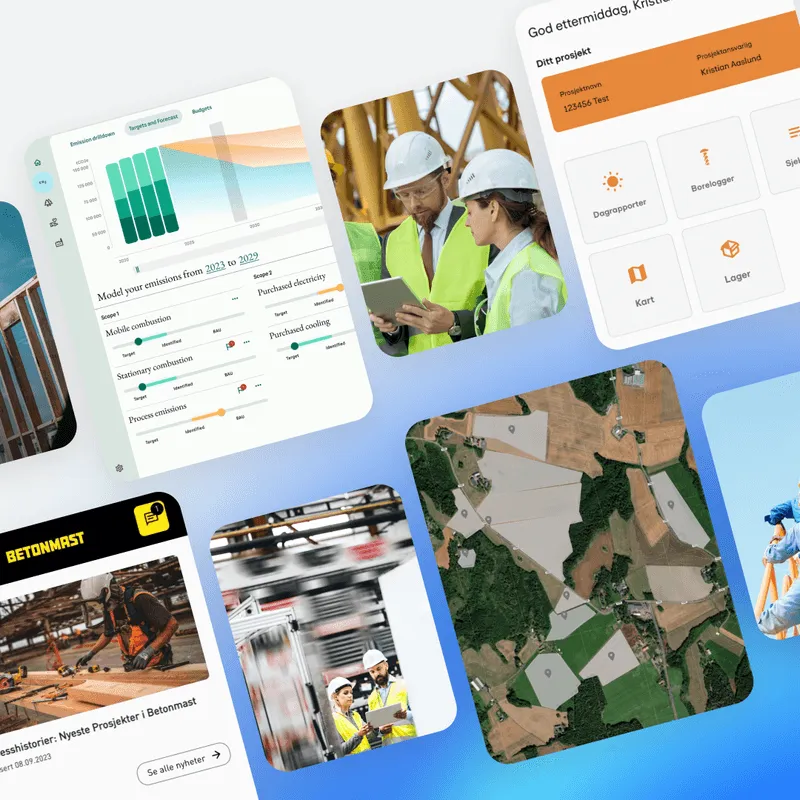
Skanska: Platform for gathering IoT sensor data
Skanska's internally developed application, Falken, is a centralized platform for IoT sensor data from construction projects, consolidating diverse formats into a single interface. It offers real-time visualization and provides the data they need to analyze, reduce, and avoid environmental impacts and risks on construction sites.

Challenge
Skanska is a world-leading construction company that employs over 40,000 people globally and around 4,400 in Norway. Their projects range from tunnels and bridges to office buildings and roads.
Skanska continuously works to minimize the environmental impact of construction sites. Multiple risks to the surrounding environment are involved, such as water pollution, dust and air quality, noise pollution, and soil contamination and erosion.
To minimize these risks, they need to be measured, and to measure them, they use IoT sensors and sensor data.
However, the data comes from sensors from several different providers. They all use different formats for time series data, alerts, and access control. It also forces the engineers to log in to multiple different dashboards to access, monitor, and act on the data, making it challenging to see the whole picture and easily discover correlations.
Solution
Skanska Digital has developed several applications on Appfarm and has implemented the platform as a strategic tool for custom software development.
The solution became to build FalkEN, a centralized data platform and application that gathers and visualizes IoT data from all their sensors in construction projects.
The FalkEN tech stack consists of three main parts:
- Dagster: Fetches data from the suppliers and third-party sensors and systems. Skanksa transforms the data into a standard format and pushes it into ThingsBoard.
- ThingsBoard: Does duplicate checking, sets alert rules, and can receive data directly from sensors and information systems.
- Appfarm: The actual application that handles everything, such as front end, business logic, creating new projects, new users, access control, map layers, and so on.
The platform gives users an overview of all Skanska’s construction projects and shows live sensor data on the map. They can also zoom in on a specific project and see live data through high-resolution drone footage.
By clicking on a specific project in the map, users get a dashboard overview of data from the last 24 hours. They can then dive deeper into the data and compare it using various filters, parameters, and time frames.
They can also share the data with their clients, such as the government and Statens Vegvesen, and give them access to the data and analytics they need, through simple access control to the relevant data.
Another important function in FalkEN is Tunnel Control. Every person moving into a tunnel needs to have a valid Bluetooth tracker to give HR and security a clear overview of who is inside, in the event of an emergency. By installing cameras in the tunnel entrances and exits, they use motion detection to detect if a tracker is faulty or low on battery, and can act immediately to resolve the problem.
The application is also on mobile, so it’s easy to use in the field when they don’t have access to a computer.
Results
Falken application provides users with a far better overview of their live sensor data, saving hours of work on analyzing and comparing various parameters.
They can also provide their customers with the information they need, with live, reliable data through easier access control.
The combination of IoT data and Appfarm improved operational efficiency and contributed directly to Skanska’s sustainability targets, and reduced risks to the surrounding environment.
In Brief
Industry
Construction
Use Case
Skanska had large amounts of sensor data from construction sites to measure environmental risks and impact, but it came from several different providers with various formats and several dashboard log-ins.
No-Code Solution
Falken is a centralized platform for a visual overview of construction projects and IoT sensor data from various providers. The application provides unified formatting of sensor data, access control, map layers, and much more.
Key Results
- Time saved in having all data available in one place
- Reduced risk of environmental impact on construction sites
- Improved health and safety of workers on site
Developed by
Skanska Digital
Learn from other industry leaders
Dive into in-depth examples of business applications developed by enterprises in different industries.
Discover how innovation leaders are achieving digitization without code, through real examples of applications custom-built to their specific needs.






